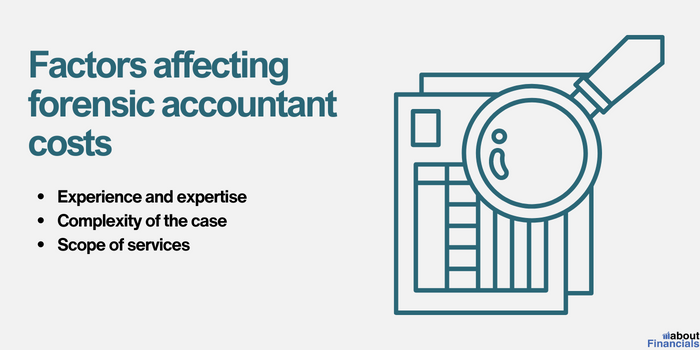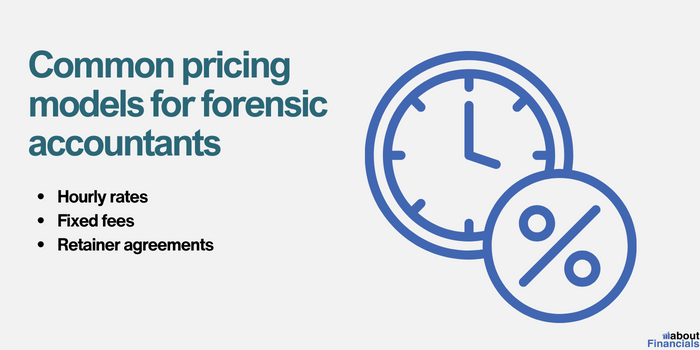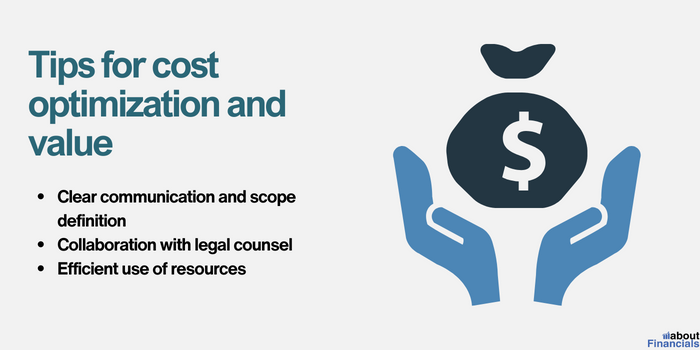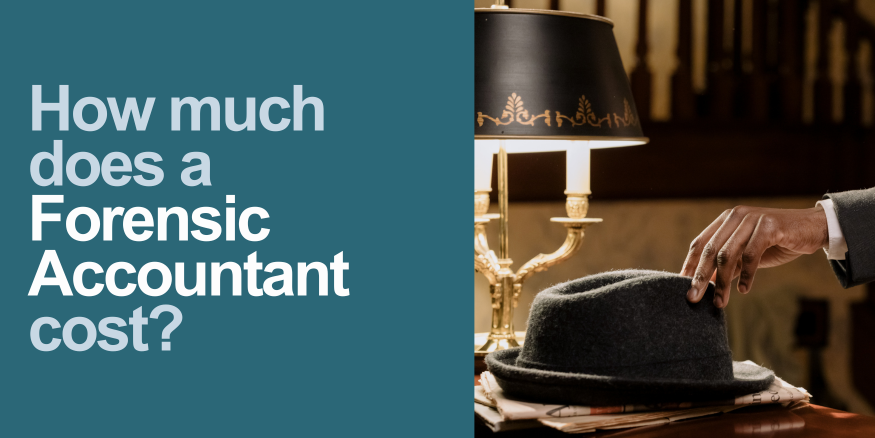Forensic accounting plays a crucial role in various financial scenarios, uncovering fraud, providing litigation support, and assisting in investigations.
One common question that arises is, “How much does a forensic accountant cost?”
Forensic accountants charge between $200 and $300 per hour. The duration of a fraud analysis engagement typically spans 50 to 70 hours. As a result, the total cost of engaging a forensic accountant for such an undertaking can fall within the range of $8,000 to $20,000. The specific amount within this range is influenced by factors such as the accountant’s level of experience and the complexity of the matter at hand.
In the below paragraphs, we will explore the factors that influence forensic accountant costs, different pricing models and tips for cost optimization.
By understanding the cost dynamics, you can make informed decisions when seeking the services of a forensic accountant.
Factors affecting forensic accountant costs

Experience and expertise
Forensic accountants with extensive qualifications, certifications, and years of experience generally demand higher fees.
Their expertise in complex financial analysis, fraud detection, and investigative techniques adds value to their services. The level of expertise required for a particular case often influences the cost.
Complexity of the case
The complexity of the financial dispute or investigation directly impacts the cost of hiring a forensic accountant.
Cases involving intricate financial transactions, extensive data analysis, or convoluted schemes typically require more time and resources, leading to higher costs.
Scope of services
The specific tasks required from a forensic accountant can vary widely, such as fraud investigation, litigation support, or expert testimony. Each service entails a different level of effort and expertise. The scope of services needed for a case will affect the overall cost.
Common pricing models for forensic accountants

Hourly rates
Forensic accountants often charge on an hourly basis. Hourly rates vary based on factors such as the accountant’s experience, reputation, and geographic location.
Senior forensic accountants with advanced certifications and a track record of successful cases usually command higher hourly rates compared to junior professionals.
On a general note, a highly experienced forensic accountant with over 15 years of experience charges $300 per hour for fraud investigations and financial analysis services.
A junior forensic accountant with 2-3 years of experience offers services at an hourly rate of $100 for basic litigation support and asset tracing.
Fixed fees
In certain cases, forensic accountants may offer fixed fees for specific services or engagements. This pricing model provides certainty to clients, as they know the cost upfront. Fixed fees are determined based on factors like the complexity of the case, anticipated hours of work, and the expected deliverables.
For a comprehensive fraud examination involving a small business, a forensic accountant quotes a fixed fee starting from $10,000. This fee includes data analysis, interviews, report preparation, and expert testimony if required.
A forensic accountant may offers a fixed fee of $5,000 for assisting in a divorce case involving complex financial issues. The fee covers forensic analysis of financial records, identification of hidden assets, and expert report preparation.
Retainer agreements
For ongoing or long-term engagements, forensic accountants may enter into retainer agreements. Clients pay a predetermined amount upfront, and the forensic accountant allocates their time and resources as required. Retainer agreements offer convenience and priority access to the forensic accountant’s services.
For example, a multinational corporation retains the services of a forensic accountant on a retainer agreement for ongoing compliance monitoring and fraud prevention. The retainer fee is set at $15,000 per month, providing access to a specified number of hours of forensic accounting support.
Similarly, an attorney representing a high-profile client engages a forensic accountant on a retainer agreement for an anticipated lengthy legal battle. The retainer fee is set at $50,000 upfront, ensuring priority access to the forensic accountant’s expertise and resources throughout the case.
Additional cost considerations
Travel and disbursements
In some cases, forensic accountants may need to travel to conduct investigations or work on-site. Travel expenses, including transportation, accommodation, and meals, are typically borne by the client.
Additionally, there may be disbursements associated with document production, data analysis tools, or other necessary resources.
Collaborative efforts
Forensic accountants often collaborate with other professionals, such as attorneys, investigators, or industry specialists, to gather comprehensive evidence and build strong cases.
Collaborative efforts can enhance the effectiveness of the forensic accounting process but may incur additional costs. Clients should consider the value added by such collaborations and evaluate their cost implications.
Estimated cost based on the nature of case
Case 1: Fraud investigation for a small business
For a straightforward fraud investigation involving a small business, the cost range can vary based on the complexity of the case. Generally, a forensic accountant spends 50 to 70 hours on a typical fraud investigation. However, if the implication of fraud goes beyond one year then incremental hours of 30 to 40 per additional year, may be incurred.
On average, the cost might range from $10,000 to $20,000. Factors influencing the final cost include the size of the business, the duration of the investigation, the number of financial records to analyze, and the required reporting.
Case 2: Expert testimony in a high-stakes lawsuit
When a forensic accountant is engaged to provide expert testimony in a high-stakes lawsuit, the cost range can be significantly higher. Depending on the complexity and scope of the case, the cost may range from $10,000 to $50,000 or more.
Factors influencing the cost include the level of expertise required, the anticipated duration of the trial, and the extent of financial analysis and reporting needed.
Tips for cost optimization and value

Clear communication and scope definition
Establishing clear communication with the forensic accountant from the outset is crucial. Clearly define the objectives, expected deliverables, and the scope of work to ensure there are no misunderstandings. This helps in managing costs effectively and achieving desired outcomes.
Collaboration with legal counsel
Working closely with legal counsel is essential to align the forensic accountant’s efforts with the overall legal strategy.
This collaboration ensures that the forensic accountant’s work is focused, targeted, and aligned with the legal requirements, thereby optimizing costs and maximizing the value of their expertise.
Efficient use of resources
To optimize costs, discuss resource allocation with the forensic accountant. Ensure that resources, including time and data, are used efficiently.
Providing organized and relevant financial records, as well as promptly responding to requests for information, can streamline the forensic accounting process and help control costs.
Final thoughts
Understanding the factors influencing the cost of hiring a forensic accountant is essential when seeking their services. Experience, complexity of the case, and scope of services are key factors in determining the cost.
Additional cost considerations include travel expenses and collaborative efforts.
Remember, it’s crucial to prioritize expertise, experience, and trustworthiness over price alone to ensure the best outcomes for your financial investigations and legal proceedings.

